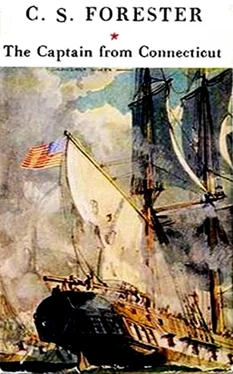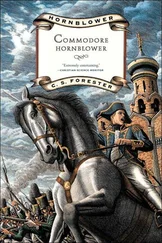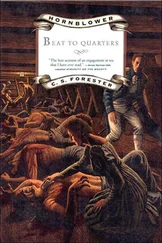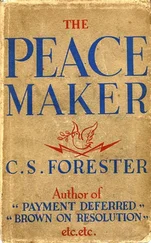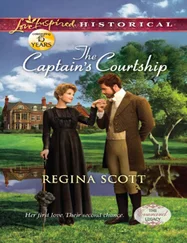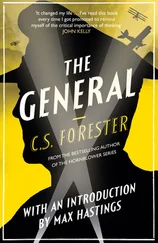“You’re very kind, sir. Perhaps I will—only a small one, sir. Just four fingers. Thank’ee, sir.”
Stanton looked at Peabody over the top of his glass; he forbore to comment—wisely enough, perhaps, seeing that he was only a prisoner—on the smallness of his host’s drink.
“Confusion to the French,” he said.
Peabody was a little startled. The French were at war with England; America was at war with England, but France and America were not allies. He wondered if he could drink such a toast, all the same, even in the privacy of his cabin. Stanton’s homely wrinkled face broke into a smile at his confusion.
“Let’s say ‘a speedy peace,’ then,” said Stanton.
“A speedy peace,” said Peabody, solemnly.
Stanton took a pull at his glass before speaking again.
“You’ve heard the latest from the Continent, sir?”
“What is it?” asked Peabody, with native caution.
“The news came in the day before we cleared from Kingston. Wellington’s over the Pyrenees. The Russians are over the Rhine, and Boney’s licked. Licked as sure as a gun.”
Peabody stared at him, but there was no doubt the man was speaking the truth. In Peabody’s throat the weak rum that he had sipped burned with the fierce pleasure which he had always to disregard, and for a moment it distracted him from making any deductions from what he was being told.
“Come midsummer,” said Stanton, “and France’ll be neutral. Aye, or before that.”
Then the British Navy would be free to turn its whole strength against the American coast, the British Army would be free to strike at exposed points, and what hope would there be then of an honourable peace?
“And then we’ll have nothing to fight over,” went on Stanton. “We won’t want to press your men, and we won’t care how much wheat you sell to the French. I’m no naval officer, sir. England was at war when I took my first command to sea in ’94, and we’re still at war twenty years after. I’d like to make a voyage—just one voyage—without wondering whether I’d be in prison before I reached the end of it.”
He drank off his glass without winking an eyelid, and stood up, submissive to any orders which Peabody might give him. On deck in the darkness he shook hands with his captor before hobbling stiffly off to the ship’s side. Peabody lingered on deck; Mason, his youngest lieutenant, had fifty men and all the skilled hands of the Delaware repairing the tattered rigging of the Princess Augusta, and when the work was finished Mason would retain six of them and make an attempt to reach Charleston—or Georgetown of Wilmington, or any other port where he could slip past the British cruisers.
Peabody suddenly became aware of Jonathan at his side, whispering urgently in the darkness.
“Jos,” he was saying, “Jos, is it true that ship’s going back to America?”
“Yes, I’m sending the brig in with a prize crew.”
“Jos, send me back in it, too.”
“What’s that?” said Peabody, quite unable to believe his ears.
“Send me back in that ship—brig, I mean. Please, Jos. Let me.”
“What in God’s name are you saying?”
“I want to go back on that ship. I want to get out of here. I hate all this. I know they’re going to the South, but I’ll be able to get back to Connecticut somehow, Jos.”
“Call me ‘sir,’ ” snapped Peabody. He was still too astonished to attempt to deal with the matter of what Jonathan was saying, and temporised by finding fault with the manner.
“ ‘Sir,’ then. Won’t you let me go?”
The boy was frantic now, plucking at his captain’s sleeve. He had at least the grace to whisper his ridiculous request, but that was little enough in his favour—on the contrary, rather, for it showed he knew he ought to be ashamed of it.
“No, I will not,” said Peabody, coming to a decision. “Get below, and don’t let me see you again to-night. Get below, I said.”
The boy went off into the darkness with something like a sob, leaving Peabody tapping angrily with his foot on the deck as he debated this extraordinary happening. There must be something seriously the matter with Jonathan if he wanted to exchange this ideal life on board ship again for the hardships of home, the orderly discipline for the madness of his parents. Peabody went back in his mind to his first days at sea. Yes, he had been homesick, too, homesick for the green valleys and the rocky hills, even homesick for his chaff mattress in the corner of the room. But he had been only twelve, and Jonathan was twenty. Now he came to think of it, it was strange that Jonathan had endured the Connecticut farm up to that age; he could have escaped from it long ago into the West, into Ohio, where the farming was so good, or even into the Federal army during the past two years.
Peabody was conscious of a feeling of disillusionment, or of disappointment—in either case, it was something which he was always prepared for.
Peabody wiped his mouth with his napkin and looked down the table, the largest that could be rigged in the mess cabin. The afternoon sunlight was streaming in through the skylight, and the cabin was sweltering hot—there were trickles of sweat down his lean cheeks, while fat little Purser Styles beside him was mopping his face unashamedly.
“Damme, sir,” said Styles, “but those beans were good. The weevils haven’t got at ’em yet. Here, Washington, I’ll have another cut o’ that pork.”
Only skeletons remained of the four scrawny hens which had been sacrificed for dinner, but there was plenty of fat meat left on the two legs of fresh pork which had been served. Everyone had eaten well, and before Washington brought in the dessert it was time for a toast. Peabody was uneasily conscious that it was time for a speech, too, but that he would not be able to give. The toast would have to suffice—he could remember by heart well enough the formula he had heard repeated in past years. He got to his feet, glass in hand, and conversation died away as all eyes turned to him.
“To the memory of the immortal man whose birthday we are celebrating to-day,” he said. “To the memory of George Washington.”
Everyone rose with inarticulate murmurs while the toast was drunk, and sat down again a trifle self-consciously.
Purser Styles, with his red face, took it for granted now that he could unbuckle the stock which was putting him in danger of apoplexy. Lieutenant Murray took wine across the table with his vis-à-vis, Acting Lieutenant Howard, Mr. Crane, the master, beamed quite genially at the three lads at the end of the table—Midshipman Wallingford, Midshipman Shepherd, and Acting Midshipman Peabody.
The captain, at the head of the table, experienced a feeling of relief; he had proposed the toast without stumbling, and this formal dinner party was bidding fair to be a success—Peabody always felt qualms of doubt when responsible for a social occasion. He frowned a little as he noticed Jonathan refilling his glass. The boy was a little flushed as it was—although that might merely be the heat—and he did not like to see it. Jonathan had so obviously benefited by his appointment as acting midshipman. It really had been fortunate that they had captured the Princess Augusta, and that Mason had gone off in her as prizemaster; the acting promotion of Howard had left a vacancy which Peabody was entitled to fill. Now Jonathan was acting midshipman, with his foot on the ladder leading to executive rank, and with the discipline of Hubbard and Murray and Crane to drive out from his mind the fantastic troubles which had been worrying him. Peabody was well content, or would have been if Jonathan were not quite so flushed.
A knocking at the cabin door heralded the admission of Quincy, out of breath with hurrying.
Читать дальше
